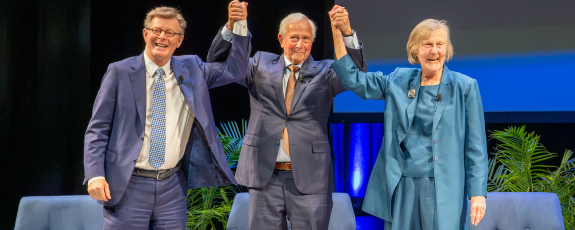
‘Our Best Days Are Absolutely Ahead of Us’
Three presidents reflect on Duke’s past and future
Keohane, who served as president between 1993 and 2004, was first impressed by how welcoming the campus was.
Brodhead, who served as president between 2004 and 2017, was struck by the architecture and saw it as “an adventurous place” that was and continues to be “future oriented.”
Price, who took the helm after Brodhead, spoke of how “Duke remains unchanged in the ways that matter most, but changed in the ways that the times require.”
All three expressed their gratitude for the smooth transitions that the others had made possible, and how the ability to build on the successes of tough decisions made by predecessors made their jobs easier.
“It’s a place of culture of collaboration, a family culture that nevertheless works strategically not so much on what we could do that makes us cool, but what universities uniquely can do for individuals and their world.”
Richard Brodhead
One of the tough decisions facing Keohane was her choice to put all first-year students on East Campus.
“It was a very controversial issue when I first came to campus,” Keohane recalled. “The decision had a great deal of support, but there also was a lot of opposition, particularly from students. I remember seeing one student holding a sign that said I was ruining Duke and that nobody would ever want to come to Duke.
“So it was a matter of some satisfaction that when I left, there was an essay in the Chronicle that stated, ‘Of course, the first-year campus has always been the greatest thing about Duke.’” The sold-out audience in Reynolds, which was filled with many alumni on campus for Homecoming, gave out a large laugh.
Asked about challenges, the three presidents noted they all shared similar concerns on major issues. Keohane talked about her efforts regarding the affordability of higher education. Brodhead reflected on the need to increase financial aid.
“My first thought was that universities should be available to everyone who wants to expand their mind,” Brodhead said.
Under Brodhead, a financial aid initiative was launched to raise funds to help attract students who otherwise might not be able to afford a Duke education.

In 2023, Price expanded financial aid support to offer full tuition grants for students from North and South Carolina whose family incomes are below $150,000.
“The socio-economic diversity has not been what it needs to be. We need to do more of that. Higher education in general needs to do more of that,” Price said. He added that Duke has raised the percentage of incoming students from families eligible for Pell Grants from 11% two years ago to 22% this year.
“We are perceived as elite, and we are elite in that we aspire to excellence, but it should not translate to behavior that is off-putting,” Price added.
The challenges associated with racial equity, and more recently with conflicts around the globe, are not unique to Duke. In describing how the university has coped with these challenges, Price praised the “high degree of trust among faculty, leadership, administration and students.”
“We have a community that is willing to slow down and engage in dialogue,” Price added.
Woodruff asked how universities should be thinking about freedom of speech. Keohane responded: “We seek truth, but in a world of disinformation and misinformation, we have to be careful. … Education was never designed to be comfortable. Often what makes it work is that it jolts you out of what you think to be true.”
Brodhead said civil discourse starts with promoting a culture of respect: “It’s the function of universities to protect the work of curiosity in all the different human domains.”
Price added, “We have to start from the position of recognizing the humanity in each other.”
Looking to the future often means learning from the past. Keohane recalled that Terry Sanford, who served 15 years as Duke president, coined the term “outrageous ambitions.”
“So many institutions as they reflect where they are probably feeling their best days are behind them. No one in this room feels like the best days are behind Duke. Our best days are absolutely in front of us.”
President Vincent Price
“Decades later we still have outrageous ambitions. I hope that’s always true of Duke,” she said.
Brodhead likewise hoped that the university holds on to special characteristics. He recalled how he was struck by the distinctive collegiality of faculty and leadership of the schools across the campus.
“It’s a place of culture of collaboration,” Brodhead said, “a family culture that nevertheless works strategically not so much on what we could do that makes us cool, but what universities uniquely can do for individuals and their world.
“Duke has special strengths like that. What I hope for Duke is that it doesn’t try to be like some other school that lacks the things that makes Duke special.”
Added Price: “It’s not just ambition, it’s the desire to do things the Duke way.
“Optimism seems to be in short supply these days. So many institutions as they reflect where they are probably feel their best days are behind them. No one in this room feels like the best days are behind Duke. Our best days are absolutely in front of us.”